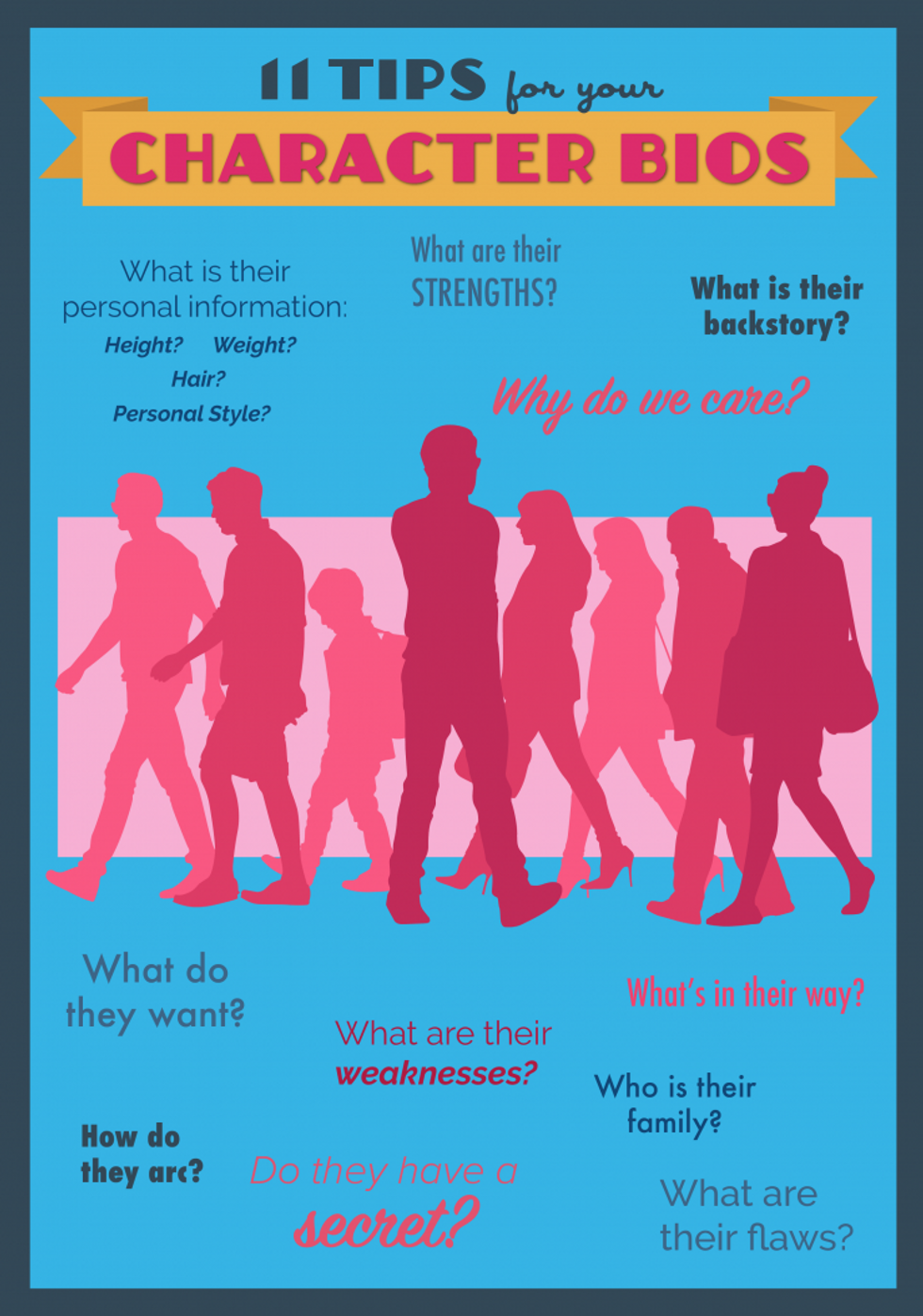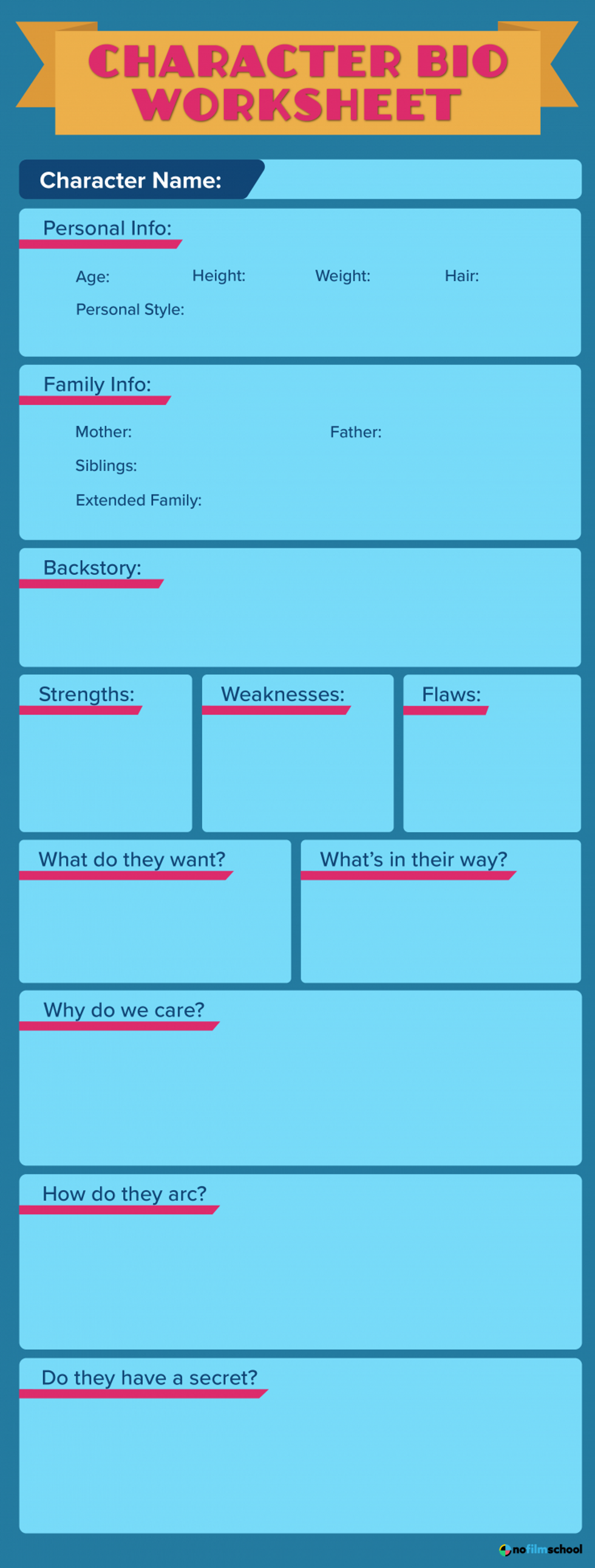11 Tips to Spice up your Character Bios (FREE Template)
Character bios may seem like busy work, but they’re crucial outline tools that bring light and life to your stories.

If everyone has a story to tell, then every character in those stories needs to be made up of stories of their own, so the tale comes across as real and engaging.
The more detail you give your character, the more the audience can identify with them and the easier it'll be for your project to find its way to the big or small screen. To get your characters in shape, I recommend writing a character bio for them.
Today, we'll go over character bios, mini character bios, and we'll even give you some tips and tricks to deepen your characters with our character bio worksheet. They're the same as character profiles, so if you came here looking for those, you're in the right place.
So let's dive in!
What is a Character Bio?
A character bio, or character profile, is a few sentences or pages that make up your character's story. They help embellish your character's traits and aid in character development and mapping out your character's arc. The bio should give the person reading it a way to personally connect with the character. It should not matter whether or not they are a protagonist or an antagonist; the bio needs to provide information that makes that person more human. These bios don't have to occur on the screen. But they should be known by the writer, director, and actor to give depth and meaning behind every choice, and be available to provide backstory as needed in the script.
Mini Character Bios
A mini character bio is a one-sentence summary of who that character is, for example, "Bruce Wayne is a billionaire philanthropist who dresses like a Bat to avenge his parents' death at the handle of a criminal." Your mini character bio can help when you're pitching your characters. But if you're creating a bible or a treatment, you might want to write a longer character bio, so development executives know exactly what to expect from the characters in your screenplay.
How to Expand your Character Bio
Since screenwriting is an economical way to get ideas across, we often lose out on the art of expanding our character bios. But we have to be ready to give the long-form version of these biographies because they'll help inform the people playing our character and the casting search. They also are great in helping us define the hoops and hurdles people need to go through to arc. If we now why our characters are a certain way, we can help change them moving forward.
11 Tips for Your Character Bios
When you're expanding your character biographies, it can be hard to think about all the details you need to make a complete person. I've assembled 11 tips and tricks to help you add to your characters' stories. I'll provide examples for each, and we can go through them on the worksheet we provide to help you brainstorm.
1. Personal information
This one is pretty easy. What should we know about your character? Height, weight, hair, personal style - give us the police description of who we are looking at and why they stand out in the crowd. Try to avoid cliches, such as labeling the women hot or beautiful, and telling us how muscular the men are. Sure, if you need to describe a superhero, maybe they're jacked and hot, but go a step further. What else can we know about them?
For example, what do we know about Steve Rogers when we meet him? Sure he's puny, but how big is his heart? Consider digging deep when you get here.
2. Their family
As Dom Torretto can tell you, you're nothing without your family. So whether you're the Dad playing catch with his son in Field of Dreams, or the Joker's dad putting a smile on your face, or the mother from Oedipus, all the way to Stranger Things, let us know about the characters' family.
3. Strengths?
Superman can leap tall buildings in a single bound and is faster than a speeding bullet. Elle Woods knows how to accessorize. What is your character good at? A lot of the story is going to focus on people overcoming things, and the way to plan that out is to see what they're good at and make sure the obstacles butt up against that. So pick out what you think your characters are good at and make sure that shines.
4. Weaknesses?
What's your character's kryptonite? Elle Woods relies too much on what people think of her and doesn't think enough about what she can accomplish. These weaknesses will help guide your story structure. Keep your character bio fresh by talking about your character has problems with so that we have places for them to arc.
5. Flaws?
While this might get confused with weaknesses, it's a little more personal. Maybe your weakness is kryptonite, but a character flaw would be being willing to save everyone without taking time to save yourself. Think about Peter Parker - his flaw is that he values being a hero over being a kid, and that means sacrificing a lot of his relationships. This inability to show up for his friends is a huge character flaw. And if we include that in the character bio we will know how to craft our story, or even future movies or tv episodes, around this flaw.
6. What’s their backstory?
Everyone comes from somewhere. The backstory is important because we are the sum of our parts. Your characters are the same way. Tell us where they came from and when their strengths, weaknesses, flaws, and family come from. This should be an amalgamation of all the tips - and an explanation for who the character is today. Think about Gamora from Guardians of the Galaxy. She's a fierce warrior with issues because Thanos raised her and took her from her fallen planet.
7. Why Do We Care?
Seriously. Why? Empathy is the strongest emotion. It's what connects us to your characters. Every character bio needs empathy. We need to know what these people are going through that makes them accessible to us. Michael Scott started as a character who we kind of hate, but then we realized he just wanted love. Michael was a guy afraid of dying alone, and who doesn't relate with that! Once we found empathy with Michael, he came into America's homes and became one of the most popular characters of all time. And this counts for villains too. We understood Killmonger's intentions, had empathy for his struggle, and it made Black Panther a deeper movie.
8. What do they want?
Wants and desires drive your character's intentions. They're arguably the most critical part of the character bio. The reason we watch your show or movie is to see characters reach for their goals. So knowing what drives them gives your story a ton of purpose. So what does your character want? It could be like Thanos, to rule the universe, or it could just be a small goal that drives a bigger story, like Mud's desire to get his boat running.
9. What’s in their way?
Obstacles, and how they attack them, are the definition of a character. So it's time to define who this person is and what stands in their way from being the fulfillment of their dreams. Indiana Jones wants to be the guy who found the ark, but he has to beat the Nazis to get there. Just like Chiron wants love but coming out and being a gay man is frowned upon in his community. So each character has to overcome what stands in front of them to fulfill who they are in their bio.
10. How do they arc?
We talk about character arcs here. It's the backbone of the story and should align with the story map. When it comes to the bio, we want to know where they start and where they're going. This matters especially in television because if you're staying with these characters for several seasons, we need to have illusions toward where they are going. Think about the Cheers dynamic with Sam and Diane, or even Blackish's Bo and Dre. Who are these people when we meet them? What puts a strain on their relationship and what can we do to bring them closer and tear them apart?
11. Do they have a secret?
The last character bio tip and trick that I love is to give your character a secret. What's something they don't share with the world, or something we could reveal, that deepens who they are in our eyes? You could use a character secret generator, but it's probably better to just get to know your characters. I love big reveals, like Snape's obsession with Harry's mom. But you can have little things too, like Jon Snow being a Targaryen. Wait, that's not so small, but maybe something small like an alter ego, or maybe they have a hidden fear or love. Let your character's secrets get them in trouble, add some emotion, and dictate the path of your story.
Always.
Character Bio Worksheet
What’s Next? Join our Free Drama Pilot Seminar!
Want to learn how to write a TV pilot? You've come to the right place.
Breaking into Hollywood with a writing career is one of the hardest things you can do. Fewer and fewer movies are being made every year, and now, many young writers are turning to television to find jobs. But to get a job in television, you need a sample. Samples are speculative pilot scripts that your agent or manager can hand to showrunners to prove your worth.
So get writing, and make sure every character has a bio that matters!
I can't wait to read what you write next!













